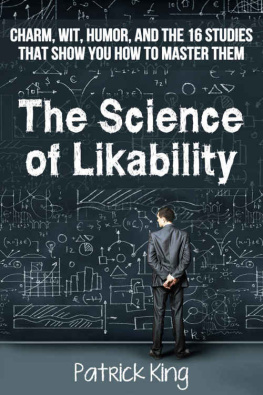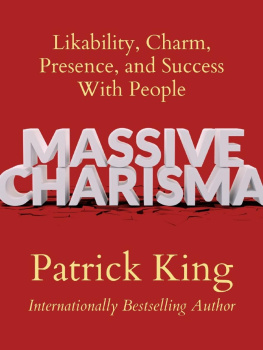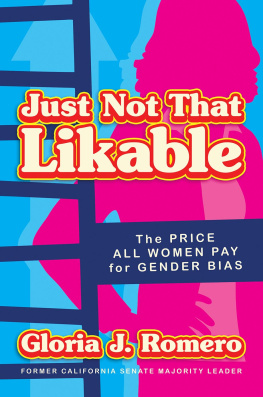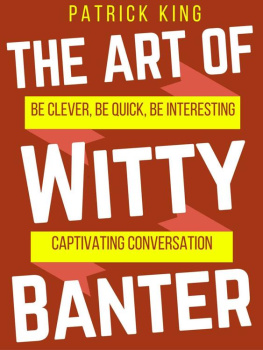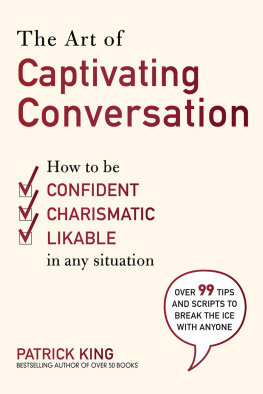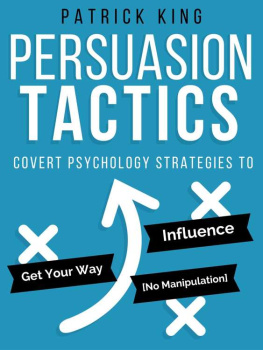King - Science of Likability: Charm, Wit, Humor, and the 16 Studies That Show You How To Master Them
Here you can read online King - Science of Likability: Charm, Wit, Humor, and the 16 Studies That Show You How To Master Them full text of the book (entire story) in english for free. Download pdf and epub, get meaning, cover and reviews about this ebook. year: 2015, publisher: Plain Key Media, genre: Business. Description of the work, (preface) as well as reviews are available. Best literature library LitArk.com created for fans of good reading and offers a wide selection of genres:
Romance novel
Science fiction
Adventure
Detective
Science
History
Home and family
Prose
Art
Politics
Computer
Non-fiction
Religion
Business
Children
Humor
Choose a favorite category and find really read worthwhile books. Enjoy immersion in the world of imagination, feel the emotions of the characters or learn something new for yourself, make an fascinating discovery.
Science of Likability: Charm, Wit, Humor, and the 16 Studies That Show You How To Master Them: summary, description and annotation
We offer to read an annotation, description, summary or preface (depends on what the author of the book "Science of Likability: Charm, Wit, Humor, and the 16 Studies That Show You How To Master Them" wrote himself). If you haven't found the necessary information about the book — write in the comments, we will try to find it.
King: author's other books
Who wrote Science of Likability: Charm, Wit, Humor, and the 16 Studies That Show You How To Master Them? Find out the surname, the name of the author of the book and a list of all author's works by series.
Science of Likability: Charm, Wit, Humor, and the 16 Studies That Show You How To Master Them — read online for free the complete book (whole text) full work
Below is the text of the book, divided by pages. System saving the place of the last page read, allows you to conveniently read the book "Science of Likability: Charm, Wit, Humor, and the 16 Studies That Show You How To Master Them" online for free, without having to search again every time where you left off. Put a bookmark, and you can go to the page where you finished reading at any time.
Font size:
Interval:
Bookmark:
Charm, Wit, Humor, and the 16 Studies That Show You How to Master Them
By Patrick King
Dating and Social Skills Coach at www.PatrickKingConsulting.com
As a show of appreciation to my readers, Ive put together a FREE TRAINING VIDEO describing the BEST exercise for immediate social and romantic confidence . Click over to watch it now!
The Science of Likability Charm, Wit, Humor, and the 16 Studies That Show You How to Master Them
Table of Contents
Introduction
Chapter 1: How to influence peoples moods.
Chapter 2: How to read people like a book.
Chapter 3: How to make friends out of enemies.
Chapter 4: How to never be taken advantage of.
Chapter 5: How to instantly become a close friend.
Chapter 6: How to negotiate anything and be persuasive.
Chapter 7: How to instantly bond with someone.
Chapter 8: How to make people trust you.
Chapter 9: How to get into someones inner circle.
Chapter 10: How to be endearing to anyone.
Chapter 11: How to make people do what you want.
Chapter 12: How to be a leader that anyone will follow.
Chapter 13: How to avoid judgment and assumptions.
Chapter 14: How to make people want you around.
Chapter 15: How to be credible and trustworthy.
Chapter 16: How to win a majority vote.
Conclusion
Cheat Sheet
Citations
Like many college underclassmen that had no idea what they wanted to study, I chose to major in psychology.
I thought it was a good default choice because the knowledge theoretically had wide application and could transfer to any other field Also, I heard that the classes had mostly multiple-choice exams and finals.
But really, I could have done much worse, as psychology has turned out to have some pretty helpful applications to my life and career.
The study of psychology isnt about reading minds or interpreting dreams, though I had a fair amount of people asking about that. Its simply the study of why people do the things they do. When you frame it that way, its easy to see why that knowledge is useful in all walks of life.
There were the obvious applications such as discovering exactly what works in advertisements and why, how to effectively use reverse psychology, and even why we dont feel compelled to take action when were surrounded by a crowd. These were things I could immediately see and feel in my daily life.
But the biggest takeaway from my degree, a bachelor of science in clinical psychology, was that so many of our decisions are made subconsciously and without any awareness on our part. It often isnt until far after we act that we rationalize why.
For example, one of the more famous experiments in psychology was called the Little Albert experiment. It involved a baby who was presented with a white rat by itself. The baby had no reaction, positive or negative.
Next, the researchers paired the rat with a loud crashing noise, which obviously scared Albert. After only a couple of exposures with the noise, Albert was presented with the rat alone again. He had become afraid of the rat by itself.
He had started associating the rat with the loud noise that he hated, and likely wasnt aware of why he was suddenly recoiling and crying whenever he saw the rat.
This was fascinating how something seemingly so subtle and unrelated could affect peoples actions in very real ways.
If people can be subconsciously conditioned about negative associations, arent there ways that people can be conditioned to react positively to objects and people? What if Little Albert was conditioned to associate positive things with the rat, such as food or his favorite toy?
This brings up possibly the most famous psychological experiment of modern day, Pavlovs dog.
Pavlov began to ring a bell every time he fed his dog. Dogs salivate when they sense that food is nearby. When he started simply ringing the bell by itself, the dog salivated as if there was actual food coming. The dog thought he was getting bacon every time he heard the bell without any real clue why.
So in short, yes its completely possible to become scientifically likable, and have people wonder why you arent present.
I set out to find the best psychological studies in existence whose conclusions could be interpreted to increase how likable someone is the ones that literally made you scientifically likable in proven ways.
A couple of these studies might seem to be proving obvious common sense, but thats only because what was subconscious is now conscious knowledge. Many of these studies have proven phenomena on likability that is extremely insightful, and perhaps even counterintuitive to human nature and psychology.
Fact is, they all work because of how our brains have been programmed over thousands of years. We dont always realize when or how, but they undeniably form an image of someone who you just cant help wanting around.
The 16 studies in this book will show you proven ways to make yourself endearing, likable, funny, convincing, persuasive, trustworthy, credible, and instantly magnetic. Why we hit it off with some people, but never with others. Thats the science of likability.
Our leaders, politicians, and most charismatic friends arent that way just by chance and luck! Whether or not they realize it, they embody much of what is taught in this book. Now its your turn.
Why do some people instantly like us, while others never come around? Is it purely on a random basis, and do we have to depend on lucky strikes of lightning?
Likability in the minds of too many people is a game of chance. The good news is they are completely wrong, and likability is like any other emotion it can be triggered, summoned, and ultimately engineered. Just like, say, the loudness of your voice, we have quite a bit of control in just how likable we are.
And for the first time ever, Ive collected a series of 100% empirical, scientific psychological studies about how and why people like .
It turns out that we all have specific and subtle, signals and hints that massively influence the way we view others. Most of them are miniscule, subconscious, and mired in the minutiae but thats what really matters.
Remember Pavlov? Its worth a repeat mention.
Pavlov is the father of classical conditioning as we know it, and proved it through a very simple experiment with his dog. Every time he would feed his dog, he would also ring a bell. Over time, the dog associated the food with the bell. Eventually, Pavlov could just ring his bell, and the dog would begin salivating because of the association with the food.
The dog was clueless as to why he would suddenly get hungry. Similarly, you can influence your likability quotient. People may not be able to articulate just why, but theyll just know that they trust like and like you.
This takes the random chance out of making a positive first impression.
Your skill in likability can open many doors. It can have a tremendous positive impact on all aspects of your life. Relationships are the backbone of a happy and fulfilling life. Build yours with likability, and take advantage of the psychological cues that science has proven over the years.
Mood influencing.
The science.
A 1994 study by Eich, Macauley, and Ryan found that memories did not exist in a vacuum. Memories were heavily linked to the context, environment, events, and moods that were present at the time of the memory.
In other words, if you are able to invoke anything that was present at the time of a positive memory, you will be able to bring up the feeling of that memory to influence and improve someones mood. You can also improve your memory by thinking about things that were present in the context of that memory, and more easily trigger a clearer understanding of what happened. They are all interrelated and help recall each other.
Font size:
Interval:
Bookmark:
Similar books «Science of Likability: Charm, Wit, Humor, and the 16 Studies That Show You How To Master Them»
Look at similar books to Science of Likability: Charm, Wit, Humor, and the 16 Studies That Show You How To Master Them. We have selected literature similar in name and meaning in the hope of providing readers with more options to find new, interesting, not yet read works.
Discussion, reviews of the book Science of Likability: Charm, Wit, Humor, and the 16 Studies That Show You How To Master Them and just readers' own opinions. Leave your comments, write what you think about the work, its meaning or the main characters. Specify what exactly you liked and what you didn't like, and why you think so.

